#obey me ch 30(?) spoilers
Text

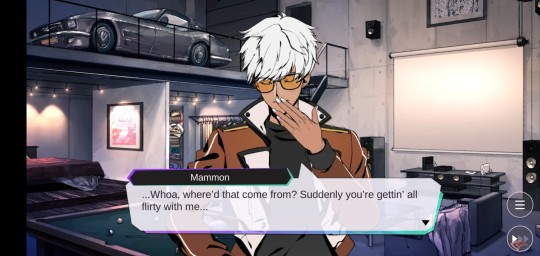

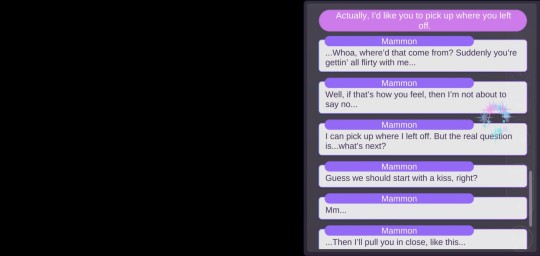
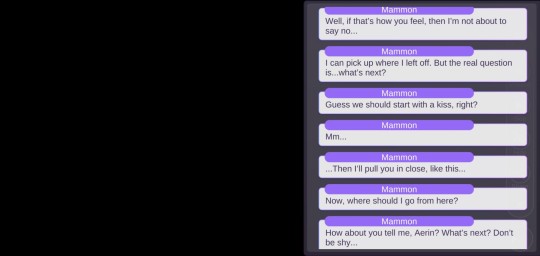
Mammon unhinged ™️
#obey me ch 30(?) spoilers#basically only spoilers if you're still as behind as i am 🥴✌🏻 or new#l'hôtel.obeyme#obeyme.mammon#obey me mammon#obey me#aerin.jpg#my post 📫
11 notes
·
View notes
Text
Ch. 30: Face To Face with Madness
Title: Face To Face With Madness
Fandom: SWTOR/Star Wars The Old Republic
Characters: Zandromeda Kenobi (Republic Trooper)
Genre: Angst, Action
Word Count: 1,304 words
Synopsis: Zandi comes face to face with the very madman that has been targeting her.
Warnings: This is the 30th chapter of the Wraith's of the Past fic for my Trooper. If you wish to be unspoiled and read the other 29 chapters, the fic is located here on Ao3
under the cut for length and possible spoilers
The worst migraine she’d ever had woke her up with a grimace. A bright light directly above her sent shooting pains lancing through her temple, she squeezed her eyes tight and tried to move her head to the side, only to find resistance. She went to move her hands, only to find more resistance. Her body stilled, her mind racing as her heart sped up with the realization she was bound and trapped. Before letting the panic to fully set in, she forced herself to focus on her breathing. She inhaled slowly, exhaled, once, twice, three times, four… Zandi was then able to focus on her body, to analyze what was going on. Despite her eyes being closed, she could still see a bright light hanging over her. Her head was held by something hard, her neck was aching, her arms pinned down as was her waist and legs. She was laying pressed to a flat, hard surface.
The memory of her mad dash to save her son on Dantooine flooded across her mind. That woman must have drugged her then transported her somewhere. She was clearly a prisoner for the Terentatek, her biological father. Fear rushed up her spine, trying to bring up her earlier panic but she ignored it, pushing it all aside. Focusing on her right hand, she moved her wrist, testing the restraints pinning her arm down. Metal and leatheris restraints, sealed with a piece of what sounded like chain-link.
“Ahh, you have awakened,” came a deep, gravely voice that rolled through the room causing her to still in her movements. The synthetic hiss on the re-verb of the voice told her two things. One, the voice was being modulated and she remembered her father with various cybernetics the last time she saw him. Two, the room was small, but held nothing that would absorb sound.
Zandi remained silent, eyes still closed due to the over bright light still quite literally in her face. But she could hear him moving, the slight rustle of fabric, the faint hiss of cybernetic hydraulics…and footsteps that sounded both heavy and yet quiet. He moved in a circle around where she was confined.
“It has been far too long, Zandromeda,” said who she assumed was the Terentatek. “Do you not remember your father’s voice?”
The question nearly made her bristle but she kept silent. He was baiting her clearly, trying to get a reaction. He moved closer, a looming, unsettling presence on her right side.
“Perhaps not, you were very young with she stole you from me,” He said, thoughtfully with hatred tainting the word ‘she’. After a moment of silence, he pulled back slightly then continued on while Zandi silently ran through various scenarios in which she attempted escape.
“Twenty two years, Zandromeda,” The Terentatek said. “I have waited much too long to be reunited with my daughter to be met with only silence. Are you stunned? Or have you truly forgotten who you rightfully belong to?”
Belong to? She thought, a thread of indignation that she was merely some object for him to claim burst in her chest. She’d been slave once, briefly…Her mother had died as a slave, died to this very insane maniac. Her lip curled.
“I don’t belong to anyone,” She said, her voice edged with sharp anger. “If you want to talk get this damn light out of my face and release me.”
Whether he’d expected such a fierce response or not was something she wouldn’t be privy to given her current position but after a moment of silence he finally moved again and the light she could see behind her eye-lids, moved. She opened her eyes cautiously, able to properly see this time. The migraine throbbed painfully at the movement but she studiously ignored it. Her gaze fell on the gruesomely scarred face, painted mostly in cybernetics. She recognized him…though it was clear he’d picked up a good deal more in the tech that practically covered him.
“Don’t expect me to release you that easily, Zandromeda,” He said with a smirk that distorted what skin was still visible on his face. “After all, I’ve spent twenty-two years searching for you, biding my time to take back what-“
“I just told you, I don’t belong to anyone,” She snapped, despite her better judgement. She glared up defiantly at him. The mixture of decades old fear and anger clouding her thinking. “I sure as the Force, don’t belong to you.”
His eyebrows furrowed as if he was narrowing his gaze at her, but the cybernetics that literally replaced or covered his eyes prevented the full effect of such an expression to get to her. “Perhaps…Perhaps you simply need to be reminded,” He said in a rather cold voice. “I do not tolerate disobedience of any kind, from anyone.”
He turned away form her before she could speak again. It gave her a moment of pause, enough to still her own damn tongue before it got her killed outright. With a deep breath, she focused and watched him move away, towards a wall to the right that was covered in monitors and computer terminals. It was clear the entire thing was a hodge-podge of various types and styles of technology. She wasn’t sure what the hell it was for but she wasn’t exactly itching to find out. Judging by the layouts on some of the monitors, her vitals were listed, live.
She took a moment to glance around, take in the surroundings of the small room. It was dark, a simple duracrete room. On her left side was another table just like the one she was bound to. A million insane ideas ran through her head as to what it all meant but each theory was more ridiculous than the last.
Finally she looked at him, or rather, at his back, “What do you want?”
He studied a few monitors before tapping at a few keys, taking his time in answering her. “I need to make sure you know exactly what and who you are, Zandromeda. Only then will you truly understand. We must undo the brainwashing that vile senator and jedi did to you, what your mother started must be eradicated…”
The literal ramblings of a madman. Whatever it was he wanted, she wasn’t going to understand. “And what does that entail exactly? Or is this some sick and twisted family reunion surprise?” She said, demanding answers. He glanced over his shoulder at her, shooting a dark glare that chilled her to the bone.
He turned away again, tapping at something on his wrist. “It is time,” he said to his wrist device. As a door opened behind her, he moved across the room and right to the empty table where he carefully laid down. An apparatus rose up from underneath his table and to the side. It hovered between both tables. A strange series of cables slipped from it and moved to click into various places on his own cybernetics.
Zandi felt the blood drain from her face as a slow and horrible thought crossed her mind. Two cables extended from the apparatus and started towards her and her own cybernetics. Her earlier panic returned tenfold.
“Oh Kriff this,” she breathed in horror and started struggling, twisting her head and limbs this way and that. “You can take this and shove it up your ass, Terentatek. I don’t-“
“Enough!” He ordered, anger and venom dripping through his words. “You will obey!”
“Kriff off, bastard!”
“If you insist…” He growled, nodding to the person she forgot entered the room. She felt a prick on her neck…and suddenly her vision blurred as the cables continued moving now that she was no longer thrashing about. It was merely a matter of seconds before darkness consumed her.
#The Rand Legacy#Second main continuity#Zandromeda Kenobi#Wraiths of the Past#Chapter 30#ao3#Swtor Fanfiction#My oc: Zandromeda Kenobi#My Fic#Beginning of the End!
1 note
·
View note
Text
Blade Runner 2049 Review
Blade Runner 2049 definitely feels like a cerebral extension of the 1982 original. However, I don't think it successfully melds its characters with the overall narrative, leaving it feeling less than the sum of its parts. On a routine mission to "retire" rogue Replicant Sapper Morton (Dave Bautista), Blade Runner K (Ryan Gosling) uncovers a mystery involving a breakthrough in Replicant biology that threatens to destroy the "wall" preserving humanity as the unquestioned master of the planet and Replicants as their inhuman slaves. At the same time, this discovery will allow corporate titan Niander Wallace (Jared Leto) to exponentially expand his Replicant production, fulfilling his dream of expanding that slave race to the point where it can finally achieve man's "destiny" of stretching throughout space.
The cinematography is beautiful and the world feels very well-constructed, but ultimately empty. Most of the settings (and sets) are barren wastelands; it feels like you could count the number of scenes showing the general population on one hand. It made me wonder who the Blade Runners are protecting anymore. I've noticed similar shifts from 80s movie grime to post-90s sheen as movies get decades-later sequels or reboots even in grim locations like Gotham City, but this looked especially uninhabited and sterile; a stark contrast to the teeming, overcrowded masses in the original. That said, the locations and sets are distinct, certainly born of the Blade Runner world, and very cool. Even if this desolation is supposed to represent characters questioning their identity—perhaps the empty world is a canvas that allows them to project their chosen meanings and definitions onto the events of their lives—I would've liked to see the world itself and the people who inhabit it, not just the main characters acting on empty sets, protecting and imperiling people we never see. Perhaps the blackout of 2022 and other tragedies of the intervening 30 years are to blame for the underpopulation, but if so, the lack of millions of Replicant slave laborers is lamented more onscreen than the loss of human life. No one voices a concern that there are so few humans left that extinction could be around any corner. It's also curious where the multi-ethnic civilization from the original went; as I've heard commented elsewhere, this future LA is exceptionally white.
The movie's pacing was very slow, making this nearly three hour movie feel even longer. Slow, long pans over settings are in line with the original movie, but I didn't like them there either: they slowed down the story too much and that film was 50 minutes shorter as it is. Here, they exaggerated the length even more without adding anything. I wouldn’t say I was bored, but I did feel like the movie could get on with things at several points. For instance, K's journey of discovery about his identity felt very slow and seemed like it could've been edited down to get to his answers (and Rick Deckard (Harrison Ford)) faster. As it is, the pacing made me leave the theater with a "that's it?" sense that not much happened. The score's sound mix was far too loud; so loud the volume was uncomfortable and the chairs in my standard showing were shaking. That said, I liked the return to the distorted electronic score of the original film. It felt very much of the world, except one chase scene where the music was far faster than anything before or after, making it feel out of place.
As empty as the world was, the special effects were fantastic! While flying cars were impressive in the original and seamless here, the true standout effect was K's holographic girlfriend, Joi (Ana de Armas). They found a perfect balance between giving her enough solidity to believe she was really interacting with her surroundings and showing us the imperfections in the holographic projection to remind us that she's not. One of the film's rare moments of humor was a perfectly executed joke where, just after a clever and touching moment of Joi feeling rain—holographic, to match the real rain—on her "skin," a romantic embrace with K was interrupted by her data stream pausing as he got an incoming call. The standout moment for the CGI surrounding Joi was a moment where she synced her movements with Mariette (Mackenzie Davis)--a physical woman--to give herself a solid presence. The filmmakers created an outstanding—and slightly unnerving; given how well they were visually mixed—blend of the two women. The CGI in that scene was seamless (except where intentional, when the sync didn't hold) and absolutely deserves an Oscar nomination.
Ultimately I think the original film has a better, more succinct story with enough discussion on the subject of what constitutes humanity—and the tragedy of the brevity of life—to be satisfying. There's also more action in the original if that's what you're looking for. However, 2049 has a much more conflicted main character (though young Deckard was far more emotive and Ford gave a livelier performance than Gosling does) and a stronger central relationship/love story than we saw between Deckard and Rachael (Sean Young). That's partially because we join 2049's lovers after they've been together for a while, but also because there's no scene between them as uncomfortable as the night Deckard and Rachael first sleep together (which absolutely seems like he rapes her). The original's villains (if they are the villains) are also much better-crafted: the struggle to live a normal lifespan is far more engaging and relatable than Niander's explicit plans to breed a slave race, even though the latter is more socially relevant. The oppression theme is far timelier, but Niander is so one-dimensional in his villainy that he isn’t engaging as an enemy; he just serves to speak for society. I also think there's a problem with the vast majority of Replicant slaves being white people, which sort of seems like saying the only way to get white people to empathize with the oppressed's strife is by making the oppressed white people rather than people of color (the actual oppressed in our society).
Full Spoilers...
Gosling—whose K is almost immediately revealed as a Replicant—was very good at crafting a robotic manner enhanced with enough emotion to convey his feelings and sentience (though whether those emotions are programmed to give him the impression of personality may be up for debate, at least initially). This gave his robotic demeanor the gravity of someone who doesn't like their role in society or the mistreatment they receive every day because of who they are. He had a solid arc beginning as a Replicant used to hunt his own and I liked that he saw himself differently from the Replicants who ran: he was programmed to obey, after all. That was a clever parallel to "model" minorities whose good behavior is used to “prove” there’s no need for the system to change how it deals with various minority groups because some of them are doing well socioeconomically or are “behaving,” and those who aren’t are “bringing it on themselves” (and there’s no question he was constantly on thin ice as well). I also liked K's distaste for hunting down his own; there's a definite feeling that even if he tells himself he's different from the runners, he knows there's not really a difference between them and him. That emotion is the first indication he thinks for himself, because there's no reason to program it into a Replicant designed to hunt and kill other Replicants. I liked seeing his daily routine before his world spirals out of control; that was a good way to bring us into his life, show how the world works, and get a glimpse of the mistreatment and scrutiny he experiences from his neighbors and even his colleagues in the police department. The reconditioning he goes through each day was the perfect demonstration of how humans keep Replicants under control and how tenuous even well-behaved Replicant freedom is.
I loved that K turned out not to be the Replicant miracle baby. I totally fell for the expectation that yet another white guy would be the Chosen One, so to reveal it was actually Dr. Stelline (Carla Juri) was a great twist I didn't see coming, but made total sense in hindsight. It's also cool that K faced not being special, not belonging in the traditional sense, possibly not knowing real love, losing the individual name Joi gave him, and not having the soul he believed came with natural birth, but chose to do the right thing and make a difference anyway. If we're to look at the Replicant revolutionaries as a religious order, then their call to murder Deckard to protect the miracle baby makes the argument that K is purer morally than they are without the benefit of religion. Everything he believed in is stripped away, yet he's still a hero: he purposefully walks into the nothingness Roy Batty raged against to save the day. Batty believed what he'd seen made him special and made his death a tragedy; K loses all that traditionally makes a movie hero special and does the right thing anyway, even willingly sacrificing himself. Then again, protecting people and retiring rogue Replicants—Luv (Sylvia Hoeks) in this case—is what he's been programmed to do all along, so how much of this is his choice to begin with? I don’t think that’s a narrative rabbit hole that needs to be explored; it’s a stronger story if he made the choice rather than blundered into stopping Niander because he was programmed too well.
Joi was my favorite character in the movie and I'm glad she got the exploration she did. Ironically, she felt the most human out of everyone, despite being the least "evolved" form of intelligence in the film. Her excited reaction to being able to leave the apartment (with a portable holographic projector) was a nice nod to the fact that Replicants aren't the "lowest" form of life anymore; if K were less humane, she might be used just as he is rather than given relative freedom. Another character says there "isn't much" to Joi's mind, giving the impression that Replicants have at least learned an air of superiority from their human creators if not inherited a full-on racist viewpoint. You could argue that’s a hint Joi’s humanity is all a program, but I believe the Replicants were just as wrong about her as humans were about Replicants. She seemed concerned she could die and knowledge of her existence indicates to me that she’s sentient. At one point she "pounds" on K's car and yells to wake him up as danger approaches; why would she mimic emotions that he's not conscious to experience? I believed Joi when she said she loved K, despite whatever programming may've been installed in her (after all, he’s programmed too and we’re supposed to take his emotions at face value). Just like he does, I bought into their relationship completely and really enjoyed it. I was surprised how invested I was and I liked how believable their chemistry was. Whether or not their love was just a program didn't matter to me: if a computer can perfectly emulate both humanity and love, who's to say that "emotion" isn't real? On the other hand, like K, perhaps I just don't want to believe their love was a lie.
It's interesting we didn't see Joi sexualized or exploited as K's holographic girlfriend (even during a sex scene), but the fully naked billboard version at the end absolutely was. The Joi K loves has agency, but the billboard is for sale. This may've been a play on virgin/whore classifications placed on women: the loving, humanized Joi is an idealized, loyal, movie-friendly picture of a wife, while the billboard version is the exact opposite. Though the movie wants us to believe her love was fake by repurposing her lines and the name she gives K, I don't believe it. Or don't want to. I can see the argument that she was never real: shouting to wake K up could be a safety feature or something akin to an alarm clock, which also activates whether you’re awake or not. Willing to have herself taken off the home network and put in danger could be a step to "prove" how much she loves him. Hiring a prostitute to act as her physical proxy could be part of her programming rather than a choice…but if so, why was she so possessive and curt about kicking Mariette out of the apartment instead of acting like it was a normal function? There was emotion behind her dismissal of Mariette after “they’d” slept with K and in her reaction to Mariette saying there wasn’t much in her head. If she's not real, it's a subversion of both the expectation that the hero should get the girl and the trope of a hero avenging a dead lover. On the other hand, I wonder if saying Joi isn’t who K thought she was is not only a way to subvert multiple cinematic tropes at once, but a way of saying she’s more complex than anyone thought. Why should she choose between solely being the loyal housewife or the “whore?” Who’s to say her love—even if programmed—for K/Joe isn’t every bit as genuine as the love she has for anyone else who uses her program? Perhaps the real-life parallel is not that Joi dies only for K to find out she wasn’t who he thought she was afterward, but that she breaks up with him and moves on, which would recast his reaction to the billboard as a selfish ex calling his former partner a whore for dating someone else. Are we sure no data from his household computer was sent back to the central network through the antenna he breaks, so any Joi could recognize him (perhaps something like a backup feature in the event of damage to the household mainframe)? If not—and if we’re to read the scene as though nothing his version said mattered—her depiction (and borderline vilification) as a giant naked advertisement for companionship to anyone and everyone is fairly sexist. Her love isn’t real if he’s not special? She isn’t a real person if she’s not for him alone?
While it ultimately doesn't matter if Deckard is a Replicant or not, I absolutely would've liked to see more of Harrison Ford in the film. It takes a long time to get to Deckard and while he does get several strong moments—including a very touching moment that’s perhaps the only time I've seen Ford cry onscreen—I wanted more. At the very least, Deckard should've had a discussion with K about the legitimacy of seeing Replicants as equal to humans. No one is in a better position to answer that question than a man who either believed he was human and found out he wasn’t or who was a human and fell in love with an artificial intelligence. Couldn't they bond over their love for an "artificial" woman? Leaving their conversation at "strangers is best sometimes" felt like a massive missed opportunity. Deckard is also the best link to the way things used to be the film offers; he has nothing to say about the new state of society? About Replicants, even though he fell in love with one after killing their kind, was saved by a supposedly evil one, and he's been on the run/in hiding as one (or for abetting a runner) for 30 years? About Replicants doing the job he used to (which could make him a foil for Gaff (Edward James Olmos))? About the similarities between Tyrell and Niander, and Niander's much more blatant slave race plan?
I think there are enough hints to say that not only is Deckard a Replicant, but that this theory is correct and he's designed with Gaff's memories. Not only do the very significant animal sculptures reference Gaff's origami, but Gaff commenting "I wanted to be alone, Deckard wanted to be alone; so we were partners and we were [alone]" strongly implies they were alone together because they're the same person. The horse sculpture Deckard carved that connects to K’s implanted memory and triggers his rebellion is similar to Deckard's unicorn dream, which proves he's a Replicant because there’s no way for Gaff to know about it unless it was implanted from either a devised memory or Gaff’s own recurring dream. When he finds the origami unicorn, Deckard realizes what he is…so he goes rogue with Rachael, just like K does when he realizes the significance of the horse. Sure, Deckard doesn’t burst through walls and couldn't break the handcuffs K easily does, but Deckard was never shown to be super-strong in the original movie (and he does punch K several times without being hurt himself). If Tyrell really did engineer Deckard and Rachael to produce a child as Niander teases, that makes their rapid love story in the original film more than a movie trope: their attraction is predetermined and planned. Perhaps their rapey love scene was programming activating within both of them instead of a moment where Deckard chooses to force Rachael to stay with him; maybe Rachael was able to fight her programming due to her existential crisis (having just learned she was a Replicant), so she didn’t know what was her thought/desire and what wasn’t, while Deckard didn’t realize what he was, so he didn’t know to fight. That’s not a happier reading of that scene, though, as she’s still forced to sleep with him against her will and he’s also forced to do what he does. Additionally, while a human/Replicant hybrid would break down the wall between the two species, a fully Replicant child would obliterate it. The ability to produce a child without any human intervention would make them a species unto themselves. I think that's the greater breakthrough, as well as a reason making Deckard a Replicant makes more sense and matters more to the “what is humanity?” question than if he's just a human.
I liked that they took the "some Replicants have open-ended lifespans" idea from the theatrical version and kept the ambiguity of whether or not Deckard is a Replicant from the Final Cut. That was a smart way to honor what most audiences have seen while continuing on from the "true" vision of the movie. That said, I really would've liked a solid answer one way or another on whether Deckard is human or not. A major theme is "is there really a difference between humans and Replicants (and holograms)?" so it doesn’t really matter, but I think they should’ve pulled the trigger on that answer. Why keep stringing us along? Why would Niander introduce that ambiguity to Deckard when interrogating him; wouldn’t that confuse the situation for Deckard instead of helping Niander get the answers he wants? The “what is humanity?” question would be much stronger given a human-seeming hero like Deckard who isn’t human. Furthermore, while the "what makes reality/humanity real" theme is interesting upon reflection, I think there's a line where ambiguity stops being clever and conversation-provoking. Instead, it becomes a tedious exercise in contorting yourself to avoid making choices. If everything is ambiguous and nothing is certain, at some point why should we care about any of it? Why tell a story that has no answers, and therefore makes no statement? How do you leave the audience with any message if you have to rely on everyone to come to the same conclusion (a near impossibility)? I want to know what the filmmakers are saying, not question whether I’m guessing their intentions correctly or not.
Jared Leto's Niander certainly had a memorable, distinct presence, but he was too obviously evil and one-dimensional. At least Tyrell, as self-important and manipulative as he was, seemed to genuinely be sorry he couldn't help Roy Batty (even if he were equally sorry that meant he wasn't God and couldn't save himself). With Niander, my first and only impression was that he was evil and needed to be stopped; with so much ambiguity in this film and world, it's odd they didn't try to make him more complex (though if you’re going to make just one thing unquestionable, it absolutely should be that slavery and oppression are evil). I would’ve liked to know why he thinks humans shouldn’t rise to the occasion and do the hard work he expects his slaves to. Just saying “all civilization is built on slavery” wasn’t enough of a reason for me. I don't think the film even needed a personification of evil; their society's disdain and lack of concern about how they use Replicants would've been enough to form an enemy bigger than anyone could fight on their own (not to mention a better representation of our real-life systemic problems). I think it would've been stronger to remove Niander, leaving K a slave to the faceless government and its systemic hatred of Replicants while simultaneously exploiting him to further their goals. That way, even well-meaning and friendly officials are implicated to a greater degree. I don't think the story needed to give evil a face which will, I assume, be ultimately and probably relatively easily overthrown in a potential sequel. As memorable as it was, at first I couldn't tell if Niander's cadence was due to him being a Replicant himself, which raised a confusing question that didn't need to happen. I did like his floating devices that acted as his eyes to counteract his blindness, though; they were cool touches of futuristic technology.
Robin Wright was solid as K's trusting police Lieutenant Joshi. She walked the line between wanting to believe K—and maybe even liking him—and having next to no qualms about having him retired if he went too far off his baseline. She does give him two days' head start when it's apparent he'll be retired, but that's at least partially because she believes he's maintained the "wall" between humans and Replicants' social standing and feels indebted to him. That this wall is meant to keep Replicants in their place, coupled with the not at all veiled threat of a slaughter (of the Replicants, no doubt) if the wall falls, reinforces her position as an agent of the systemic oppression the Replicants find themselves manufactured into. She also continues tracking his location, so I’m not sure how long her courtesy head start would’ve extended. Even if I misread her and she is fully on his side, it’s likely the government would eventually force her into choosing to side with him or them, and I have no doubt she’d choose to maintain the order she’s so dedicated to by turning on K. Her wall would crumble if a Replicant who needed to be retired was proven innocent too, I’d imagine. I would've loved to see the complexity of their relationship—and her position as an agent of society—explored further.
Niander's right-hand-Replicant Luv was an effectively cold, intimidating enforcer. However, she didn't get a chance to show many sides of her character and I felt there was a lot more to explore with her. Did she work for a slaver for preferential treatment or just because she was programmed to obey? It’s likely the latter, but was there a moment when she chose to continue working for him? Did she see other Replicants as lower than her or different in some way, like K did? Did she hope Niander would be successful at creating natural Replicant birth so she could play a role in leading the Replicants out of servitude? Was she shamed by her inability to give birth (a suggestion I’ve seen elsewhere interpreted Niander’s murder of a newly “born” Replicant in front of her as a shaming tactic)? I would've liked to see what her goals were—if any—beyond carrying out his interests. She certainly had an air of superiority, both making a point to tell K that she’s “the best” and boasting that she’ll lie to Niander about her reason for killing Joshi and he’ll believe her, which could’ve been capitalized on more. How long has she been lying to him, and has it just been to further his plans no matter what it takes or is it because she wants to go beyond his parameters to accomplish her own ends?
Doctor Ana Stelline, a memory maker for the Replicants, brought a warm human touch to the rest of the world. I loved that she had such an almost whimsical outlook on life, contrasting sharply with the bleakness in the rest of the world. For all the films' monolithic structures and vast open spaces, it's a woman in a glass box that cares to consider the little, personal things to perfectly craft life-defining (and altering) memories. It's fitting she had such warmth, given she created it for the Replicants. Her immune deficiency was a smart reference back to the world of the original, where humanity has not eradicated disease despite other accomplishments. Her illness also felt like a callback to JF Sebastian, one of the original film's Replicant designers who suffered from “Methuselah Syndrome,” causing him to age more rapidly than normal. It's interesting that the ill are used to create slaves with physically perfect bodies in this world. I would’ve liked to know more about what she thought of the world and Replicants’ place in it. My friend wondered if Doctor Stelline is even sick; it's plausible her records were faked and no one knows for sure. I wondered if she's building her own rebel army by seeding the horse memory into every rebellious Replicant's mind (their leader Freysa (Hiam Abbass) tells K they all wanted to be the savior). That could be a cool way of starting a rebellion, though we see next to nothing of Ana’s views of the outside world so who knows what she thinks (I would guess she’s sympathetic to Replicants since they’ve been protecting her).
Dave Bautista was great in a serene, reserved role as Sapper. This was a nice departure for him and it's good to see him flex his acting muscles in such a growing variety of roles. It would've been interesting to watch K viewing a file on Morton to let us know who he was before he witnessed a miracle. I wanted to see the impact of a miracle on someone who didn't feel personally connected to it; was Sapper a different man before he knew the greatest Replicant secret of all time? Edward James Olmos was also good in his brief cameo. Bringing Gaff back was a smart, logical nod to the original and I liked the hint he gave to whether or not Deckard is a Replicant. Likewise, Sean Young's cameo—both in clips of the original film and with a new Replicant copy (provided by CGI and performance double Loren Peta)—was well-used! It was great to see they didn't decide to only bring Harrison Ford back from the original. I also liked how they employed scenes from the first movie to manipulate Rick (and set K's investigation off).
While most of 2049's characters raise intriguing questions (even if I wanted more from many of them), the overarching plot fell short for me. The search for a Replicant savior was mildly interesting—mostly in terms of discussing whether or not K had a purpose—but neither the revolutionaries nor Niander advanced that plot at all. The Chosen One does not add to either side’s cause and we never really learn what the rebels plan to do with Ana beyond holding her up as a symbol of their species-hood. It’s not like they can breed amongst themselves anyway—Tyrell made it clear in the original that once the Replicant DNA is developed and grown, it can’t be changed—and we’re given no indication that they have access to the technology to make fertile Replicants even if they could figure out what was special about Ana, Rachael, and potentially Deckard (though they’re more than willing to sacrifice him, which I would say is the one strong hint that he’s human). It felt like that plot was a stalemate (if that, considering the two sides don't really come into conflict except through K) left hanging in hopes for a sequel. I would've preferred the Replicant rebels begin their uprising in this movie rather than remaining in a holding pattern. Either way, I didn't leave the movie stoked for a rebellion or with the feeling one was even necessarily coming (since Niander can’t create his slave race and even Deckard was no help, the rebels could conceivably just let Ana stay hidden forever). If Ana gets more to do and Deckard plays a major role I might be interested, but this movie didn't hype me up for a sequel. Perhaps it's because the rebellion felt so extraneous to any of the main characters' stories, their much more interesting personal questions, and even to finding the miracle baby that I'm not invested. I feel like HBO’s Westworld did a better job of covering an artificial intelligence’s burgeoning rebellion if not the dawn of consciousness as well. Perhaps like the memories Ana creates, the point of the movie was not to spark a full-on rebellion, but to rebel against an oppressive society by preserving the little moments; to give meaning to small connections (such as between a parent and child or a pair of lovers) that help preserve (or create) humanity in desolate loneliness.
0 notes
Text
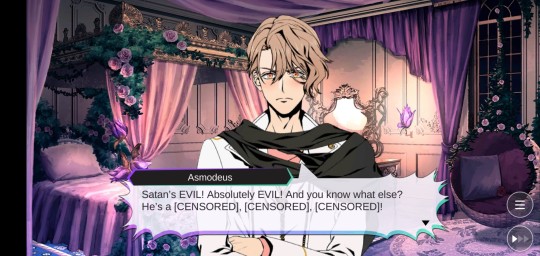
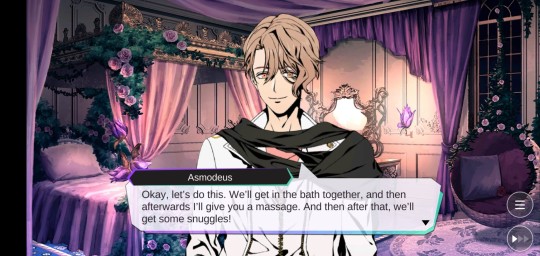
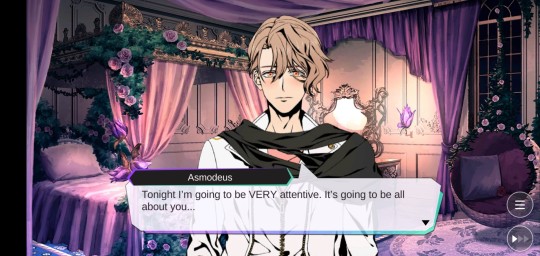

Asmo going from 0 to 100 real quick 😳
#a bath and snuggles sound dope rn pls 😭🤲🏻#esp when you're sick as a fucking dog AGAIN.... just a lil tlc is all a bitch is asking for 🥲🙏🏻#obey me asmodeus#obey me ch 30(?) spoilers#obey me asmo#l'hôtel.obeyme#obeyme.asmo#obeyme.asmodeus#aerin.jpg#my post 📫#obey me
3 notes
·
View notes
Text
⚠️ Spoilers for Obey Me ch 30+ below ⚠️
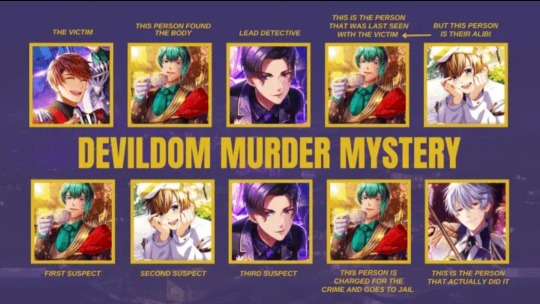
Nah but like the way all this shit just went down in chapter 30(?) RIGHT AFTER the murder mystery results I got earlier.... fuckin chills fam
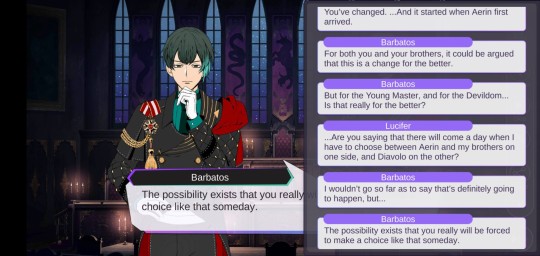

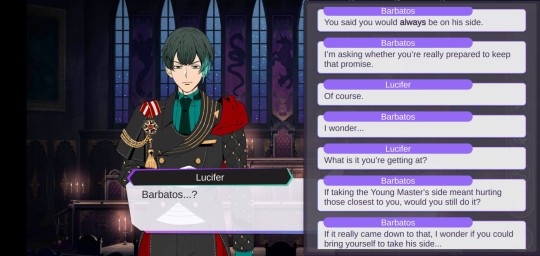
All of this feels so ominous and I'm hating it :)
0 notes